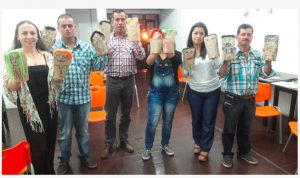FREE FLOW OF INFORMATION
An article from the Magdalena Centro Development Program for Peace (translated by CPNN)
The Development Program for Peace of Magdalena Centro (PDPMC), now in its eleventh year of management in the territory, has focused its institutional capacity to favor scenarios that seek the construction of peace from different spheres, involving all the people. With them, strategies and work dynamics have been developed with the aim of promoting the recovery of the trust, networks and social fabrics that were broken down by the violence that they had to suffer.

In this way, the PDPMC in coordination with the Foundation for Reconciliation, dynamizes in the territory the Schools of Pardon and Reconciliation (ESPERE), helping participants reinterpret the painful events that have limited the enjoyment of their lives, so that they can overcome the suffering and the painful memory of what happened.
The strategies of ESPERE are key elements that seek to rescue the individual from their pain, to restore security and confidence in themselves and in their relationships with others. This exercise also seeks to build capacities and to form “Leaders animators” in the territory who can then promote a political culture of pardon and reconciliation.
These exercises allow them to go forward in their process of overcoming the violent past to the point of feeling and calling themselves victorious; It provides needed support that can serve as a first impulse, contributing a grain of sand, so that they can overcome and then contribute from the Magdalena Centro to the construction of peace in Colombia.
The goal is that the people can involve strategies of pardon and reconciliation as elements of their life, understanding that if they are promoted as ways of living, they will humanize the everyday acts of people, valuing and seeking primarily the preservation of life.
As an end result, the PDPMC has the firm hope and confidence of not hearing more stories of violence; always with the conviction that peace is better than war, as well as dialog and the collective construction of solutions to the natural confrontations of people, recognizing that human processes build on differences to develop individual and collective relations.